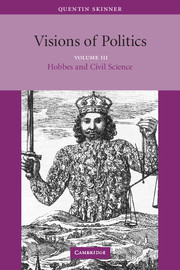Book contents
- Frontmatter
- Contents
- General preface
- Full contents: Volumes 1–3
- Acknowledgements
- Conventions
- 1 Introduction: Hobbes's life in philosophy
- 2 Hobbes and the studia humanitatis
- 3 Hobbes's changing conception of civil science
- 4 Hobbes on rhetoric and the construction of morality
- 5 Hobbes and the classical theory of laughter
- 6 Hobbes and the purely artificial person of the state
- 7 Hobbes on the proper signification of liberty
- 8 History and ideology in the English revolution
- 9 The context of Hobbes's theory of political obligation
- 10 Conquest and consent: Hobbes and the engagement controversy
- 11 Hobbes and his disciples in France and England
- 12 Hobbes and the politics of the early Royal Society
- Bibliographies
- Index
5 - Hobbes and the classical theory of laughter
Published online by Cambridge University Press: 05 September 2012
- Frontmatter
- Contents
- General preface
- Full contents: Volumes 1–3
- Acknowledgements
- Conventions
- 1 Introduction: Hobbes's life in philosophy
- 2 Hobbes and the studia humanitatis
- 3 Hobbes's changing conception of civil science
- 4 Hobbes on rhetoric and the construction of morality
- 5 Hobbes and the classical theory of laughter
- 6 Hobbes and the purely artificial person of the state
- 7 Hobbes on the proper signification of liberty
- 8 History and ideology in the English revolution
- 9 The context of Hobbes's theory of political obligation
- 10 Conquest and consent: Hobbes and the engagement controversy
- 11 Hobbes and his disciples in France and England
- 12 Hobbes and the politics of the early Royal Society
- Bibliographies
- Index
Summary
Nietzsche tells us at the end of Beyond Good and Evil that ‘I would go so far as to venture an order of rank among philosophers according to the rank of their laughter.’ Nietzsche violently dislikes those philosophers who, as he puts it, have ‘sought to bring laughter into disrepute’. He particularly singles out Hobbes for this offence, adding that such a puritanical attitude is just what you would expect from an Englishman. Nietzsche's accusation is based, as it happens, on a misquotation of what Hobbes says about laughter in philosophy. But Nietzsche was undoubtedly right to point out that Hobbes – in common with most thinkers of his age – took it for granted that laughter is a subject in which philosophers need to be seriously interested. My aim in what follows will be to investigate the grounds and origins of this belief, and then seek to explain it.
The suggestion that laughter matters to philosophy first began to be extensively explored in the early decades of the sixteenth century. A number of leading humanists took it upon themselves to enquire into the meaning and significance of laughter, the most important discussions being those of Baldassare Castiglione in his Libro del Cortegiano of 1528 and Juan Luis Vives in his De Anima & Vita of 1539. Later in the century, for the first time since antiquity, a specialised literature began to appear on the physiological as well as the psychological aspects of the phenomenon.
- Type
- Chapter
- Information
- Visions of Politics , pp. 142 - 176Publisher: Cambridge University PressPrint publication year: 2002
- 9
- Cited by



